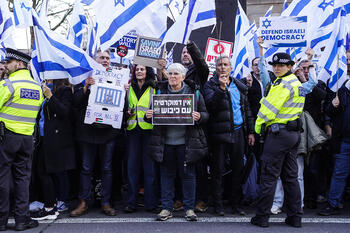
Whether right or left, Muslim or Christian, anti-Semites speak of Jews as people who pull the strings in culture, politics and especially finance. They assume we are all united in this conspiracy. In reality, not only is there no conspiracy, we Jews are also as divided among ourselves as any other people.
In their long history, the Jewish people have maintained a permanent unified state for no more than 120 years – and that was three millennia ago. It was then divided into two kingdoms before eventually being conquered and divided into separate entities. Devastation followed in the early years of the first and second centuries, when Jews revolted against the might of the Roman Empire.
Other divisions have developed over the centuries. There were notable conflicts between Zionists and anti-Zionists, and between backers of the USSR and America, which continued well into the 1960s. There were also splits between those who clung to ancient traditions, those who looked to jazz up the old faith and others who just walked away.
Today the split among Jews is largely three-way. There’s a zealot-like ultra-nationalist movement with considerable power and influence inside Israel, which could be losing a majority of Israelis and even key Zionists in the diaspora. Then there’s a relatively small, increasingly alienated but well-connected ‘progressive’ faction, which lines up against Israel. Finally, there is the majority – that is, the rest of us who cleave to a middle ground.
The zealots
Today a significant number of Jews, particularly in Israel, embrace an extreme concept of Zionism that parallels the ideas and ultra-nationalism that animated the original Zealots who fought the Romans nearly two millennia ago – and, in the process, extinguished the last strands of Jewish self-government. Those Zealots decided total independence was non-negotiable, and some ringleaders slaughtered any Jew who wished to accommodate Rome.
Those ancient Jews fought gallantly. But they also fought against each other, so that ‘the blood of all sorts of dead carcasses stood in lakes in the holy courts themselves’, as the ancient Roman-Jewish historian Flavius Josephus reported. To this day, on the occasion of Tish B’Av, Jews mourn the ensuing destruction of the Second Temple in 70 AD, an event precipitated by refusing to surrender to the conquering Romans. ‘As for our misfortunes’, Josephus laments, ‘we have only ourselves to blame’.
Today’s zealots, notes author Jacob Siegel, follow a similar ideological approach. They embrace what is widely called revisionism, the notion that Israel’s ‘land is indivisible’ from the Mediterranean to the Jordan. Unlike their antecedents, however, they are militarily sophisticated, and their enemies, though certainly bloodthirsty, are nothing like as fearsome as the Roman Empire.
This faction largely controls the current Israeli government, favours the expansion of settlements, denies any prospect for a Palestinian state and fends off any attempt, even by the United States, to impose limits on its ultra-nationalist vision. Although its members rely on the diaspora for political support and financial aid, they are also antagonistic towards it. As Ze’ev Jabotinsky, the founder of revisionism, stated in 1938: ‘Eliminate the diaspora or the diaspora will eliminate you.’
The modern zealots’ policies also provide grist for those who already have little love for either Israel or Jews. But it is easy for Jews living in the relative safety of the diaspora to underestimate the viciousness inherent in the conflict with the Palestinians. The Zionist conquest of Palestine was so violent in part due to unrelenting and uncompromising resistance among Arabs to even the notion of a Jewish state. Attempts to wipe out the Jews in the Middle East go back to the 1930s when the Yishuv, or Jewish settlement, suffered numerous massacres and pogroms. Some Zionists, and not only the extremists, retaliated with sometimes vicious assaults on both defenceless Arab civilians and British occupiers.
The mainstream of Zionism during the 1930s and 1940s was leftist, Western in culture, resolute and keen to find a modus vivendi with the Arabs, notably Jordan. In contrast, the revisionist wing of Zionism – including paramilitary groups like the Irgun and the Stern Gang – showed few qualms about committing atrocities, as well as indiscriminate attacks on occupying British forces.
Today’s zealots owe some of their success to the Palestinians’ refusal to compromise, preferring to resort to unmitigated terror. This has helped turn the right-wing Likud, now under the leadership of Benjamin Netanyahu, into the dominant political force in Israel for most of the past half century.
Read the rest of this piece at: Spiked.
Joel Kotkin is the author of The Coming of Neo-Feudalism: A Warning to the Global Middle Class. He is the Roger Hobbs Presidential Fellow in Urban Futures at Chapman University and and directs the Center for Demographics and Policy there. He is Senior Research Fellow at the Civitas Institute at the University of Texas in Austin. Learn more at joelkotkin.com and follow him on Twitter @joelkotkin.
Photo credit: Alisdare Hickson via Flickr under CC 2.0 License.












